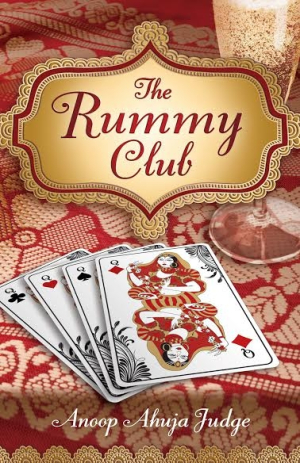The Rummy Club
- 2014 INDIES Finalist
- Finalist, Multicultural (Adult Fiction)
Anoop Ahuja Judge shines at scene setting, in both India and the San Francisco Bay Area, with abundant, lush details.
In The Rummy Club, by Anoop Ahuja Judge, four high school friends from India reunite decades later in California, with old and new struggles, in a well-developed story about what binds us and how tenuous those ties can be.
Amid midlife family, romance, and career challenges and triumphs, Alka, Divya, Priya, and Mini resume their weekly rummy night. Rummy was a pastime the four enjoyed while attending a girls’ boarding school in India in the 1980s. Ultimately, the story becomes not so much about playing cards, but about the disruption to the women’s weekly gathering by life turns and the evolution of their friendship. At one disastrous point, the games take an extended pause as misspoken words threaten the longtime foursome with dissolution.
Although the women have assimilated to American ways, their Indian ethnicity remains important. Indian food, religion, dress, and customs are integral to the story; the characters’ broader social circle is primarily Indian. Ethnic references are smoothly, in fact beautifully, intertwined to be captivating and enlightening for Western readers. When ethnic terms are used, they are consistently italicized and their meanings are immediately woven into the text: “It was pat mangni, jhat shaadi-–quick engagement, quick wedding.”
The author shines at scene setting, in both India and the San Francisco Bay Area, with abundant, lush details that are the result of her upbringing in India and many years of living in California. Priya’s passion for cooking, and her dream of opening an Indian restaurant, bring some mouthwatering moments.
The four main characters are well developed, as is the supporting cast of spouses, love interests, other friends, and children. The women’s personal, complex trajectories are also well defined and distinct, as they individually deal with issues such as arranged marriage, divorce, the death of a spouse, new romance, and the potential loss of a child. Other midlife issues like weight gain and the desire to compete with more successful friends are believably penned and well plotted: Priya’s love of food and lifelong struggle with weight begin in her teenage years, Divya’s deep insecurity about not being as wealthy as her three friends also begins in school and continues into adulthood.
Placing Alka, Divya, Priya, and Mini at an age when their children are teens and young adults, with the daily demands of parenting easing, effectively focuses the story on their adult relationships and individual pursuits, while still allowing for some family drama. Alternating between Divya’s first-person viewpoint and a third-person narrator feels slightly awkward but does not derail the engaging storytelling. The beautiful gold and red cover art allures and alludes to an ethnic Indian theme.
The Rummy Club is a perfect book club choice that may just bring weekly card parties back into vogue.
Reviewed by
Karyn Saemann
Disclosure: This article is not an endorsement, but a review. The publisher of this book provided free copies of the book and paid a small fee to have their book reviewed by a professional reviewer. Foreword Reviews and Clarion Reviews make no guarantee that the publisher will receive a positive review. Foreword Magazine, Inc. is disclosing this in accordance with the Federal Trade Commission’s 16 CFR, Part 255.

